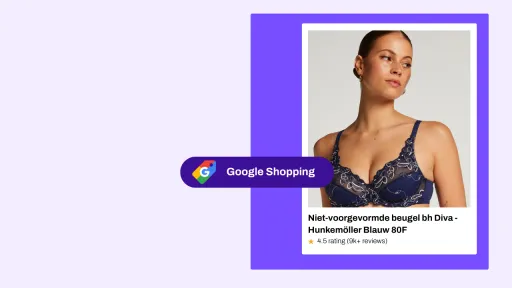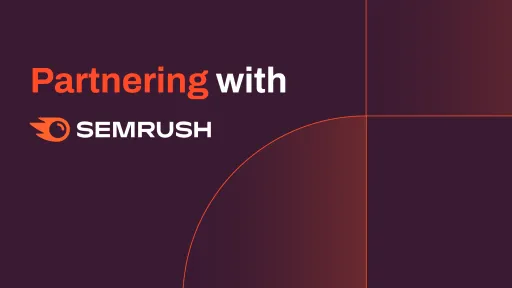SearchGPT and SEO: how to prepare for the future of AI-powered search?
Search is changing rapidly and at an ever-increasing pace. The new SERP features in Google are already hard to keep up with, and now there's a new competitor joining. A competitor in the form of (almost) a completely new model, namely search via LLMs. The biggest player in this field, OpenAI, made SearchGPT available to ChatGPT Plus and Team subscribers on October 31. Further plans are to make this available to all users in 2025. A search engine function within a program with 200 million weekly users? As an SEO professional, you should probably do something with that, right?
What is SearchGPT?
SearchGPT is an advanced search engine that combines traditional search functionality with the power of generative AI models, like the well-known ChatGPT. Unlike conventional search engines that present a list of links, SearchGPT provides direct, comprehensive answers to user questions, supported by clear references to external sources. This approach allows users to find desired information faster and more efficiently. Each result shown through Search includes listed sources. Compared to regular questions in ChatGPT, this way you can become visible in ChatGPT.
Will SearchGPT change search?
At least, that's the principle behind it if you ask ChatGPT itself, but is SearchGPT really that much better than our familiar search engines? In practice, an LLM has its advantages and disadvantages when it comes to use as Search. Where SearchGPT excels are extensive queries containing multiple words to sentences. For example, if you're an ink enthusiast and black and grey is totally your thing? Then the following question isn't so strange:
I'm looking for a tattoo studio near Dongen that can do one of the best black and grey tattoos?
When you ask this question, you get both results in the area and one of the specialists in black and grey in your region. Ask Google the same question. Then you mainly get results in your current location and get little back about specialists in black and grey. SearchGPT wins.

But in many cases we're lazy and will rather search like this:
best tattoo studio black and grey dongen
In this case, Google already shows much better results that better answer your search query:
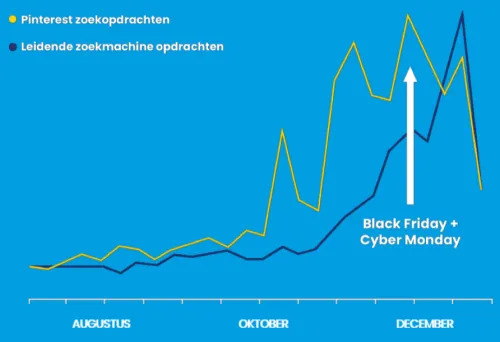
The real win goes to short search queries that we enter most often. If you enter something simple like tattoo studio, ChatGPT gives some places in Amsterdam, Rotterdam and Utrecht. Not very relevant if you're searching from Dongen in our case. Here Google proves its market leader position. Within Google you get locations near you and results about the best tattoo studios in the Netherlands, much more relevant.
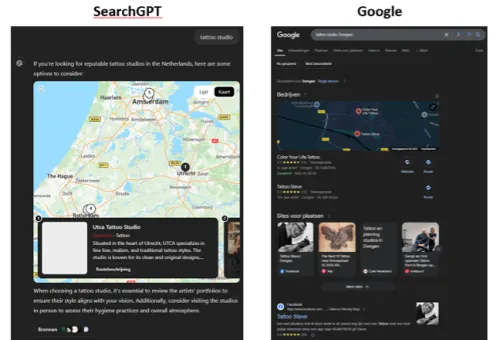
For most performed searches, SearchGPT thus still has a long way to go and Google to Bing wins over the LLM. But there is definitely room for SearchGPT for extensive and specific searches.
Is SearchGPT relevant for your business?
You can only answer that question yourself. Of course, as shown above, the chance of traffic is higher if your business is in a market with long extensive search queries. Think of niche B2B or e-commerce markets, but also for pharmaceutical companies for example, a market share shift to SearchGPT could occur. But to really get an answer to this question, you'll have to dive into your data. But ChatGPT doesn't share data? That's correct, but while ChatGPT works in a closed system, SearchGPT uses Microsoft's favorite (and own) search engine Bing. And we can actually see the data from that. Don't know how? When you already have a Google Search account, it's very easy:
- Sign up for Bing Webmaster Tools: Go to Bing Webmaster Tools and log in with your Google account.
- Import from Google Search Console:
- Click the 'Import' button under 'Google Search Console'.
- You'll be asked to give Bing access to your Google Search Console account. Click 'Allow' to grant access.
- Select sites to import: After authorization you'll see a list of your verified sites from Google Search Console. Select the sites you want to import and click 'Import'.
- Be patient and you're done: The selected sites will now be added to your Bing Webmaster Tools account and automatically verified. It can take up to 48 hours for the data to be fully processed and visible.
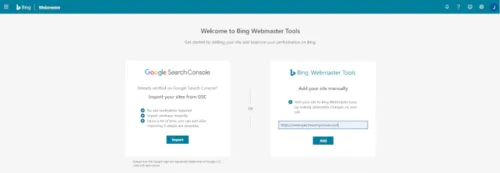
Then check if you see an increase year on year in users within Bing from October 31. If so, there's a good chance this peak was created by SearchGPT. Just loaded your data and missing this period? Then at least you're prepared to see the SearchGPT data after SearchGPT's launch to all users.
How do you optimize for SearchGPT?
There aren't many differences in how you should implement your SEO strategy to be well-mentioned in SearchGPT. However, there are several things where you need to increase priority if you want to be visible within SearchGPT. This is:
- Look differently at your content strategy: content is more important for SearchGPT than authority. A high ranking due to high authority might mean SearchGPT won't show you if your content offers little added value. Additionally, you also want to optimize for long keywords. As mentioned above, SearchGPT is much better suited for keywords consisting of a sentence to sentences. Ensure your content provides comprehensive answers to detailed and niche questions. Authority through clear author information and reliable sources is also valued higher within GPT.
- Content can be longer: In Google you don't want a user to have to search too long for their answer. LLMs can scan and read content much better and only give the user back the information that is relevant to them. Especially for technical or specialized sites, this is the moment to send your expertise to the web, to be mentioned as a source in SearchGPT.
- Structured data is more important: Just like crawl bots from search engines, structured data also helps crawlers from LLMs better understand your content when they visit your pages. This way, LLMs can better guide users to your business with more specific answers, which fits exactly with the searches within these tools.
- Check your robots.txt: Are you optimizing everything, has your web developer chosen to exclude OpenAI crawlers because they see a tsunami of bot traffic requests coming in (nothing against developers, but we speak from experience). Therefore, always check if one of the following crawlers is not excluded:
- OAI-SearchBot
- GPTBot
Think robots.txt, what's that? Then go to our knowledge base for robots.txt info.
- Optimize for Bing: Additionally, SearchGPT gets its information from Bing and therefore you shouldn't forget the most important Bing optimizations. What you should therefore definitely do if you see any substantial traffic from Bing is:
- Add XML sitemaps to Bing Webmaster Tools
- Use alt texts and multimedia optimization
- Use IndexNow
What does SearchGPT mean for SEO?
SearchGPT changes search by combining AI and traditional search functions, with Bing as the main data source. It won't change search, but is primarily a nice addition to the landscape that has been (and probably will be for many more years) dominated by Google. Especially in niche industries, SearchGPT optimization can be a nice addition to the current SEO strategy. For SEO this means among other things a focus on Bing optimization, long and detailed content and structured data to increase relevance.
Additionally, AI search solutions like SearchGPT are growing rapidly. Not only ChatGPT is working on this, Meta is also working hard to gain market share in the search landscape. Keeping an eye on this development and making your own data insightful to quickly respond to these developments is essential in this phase. Do you see a switch from Google to for example currently Bing? Then be a pioneer in your industry and don't stare blindly at Google, but also optimize for LLMs like now mainly SearchGPT and Bing.


